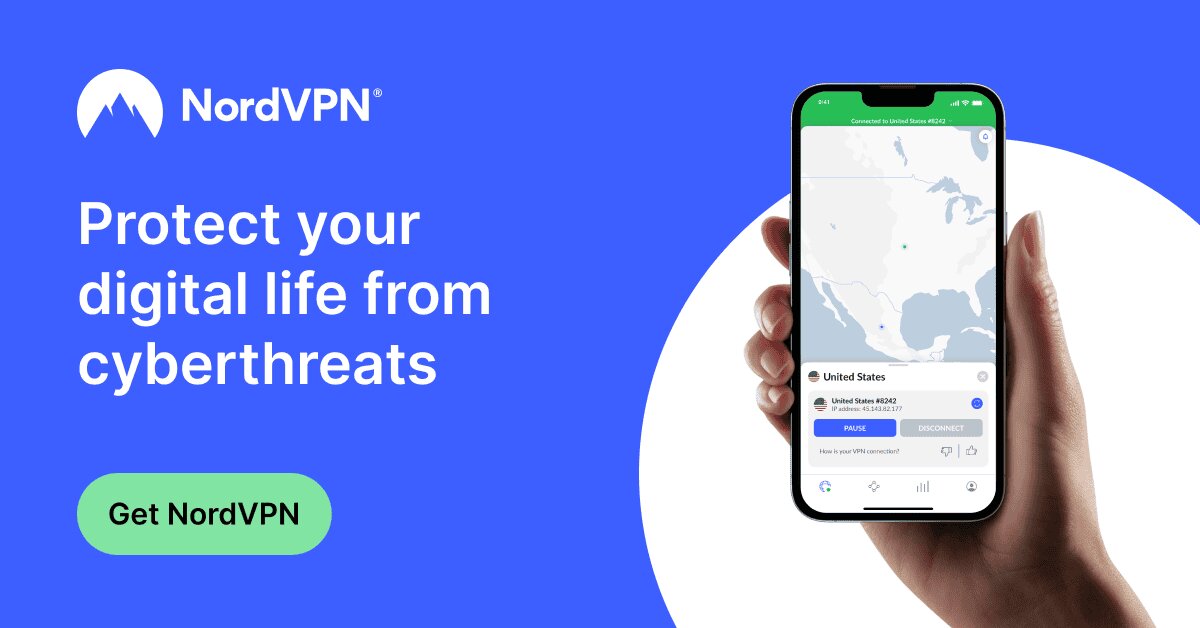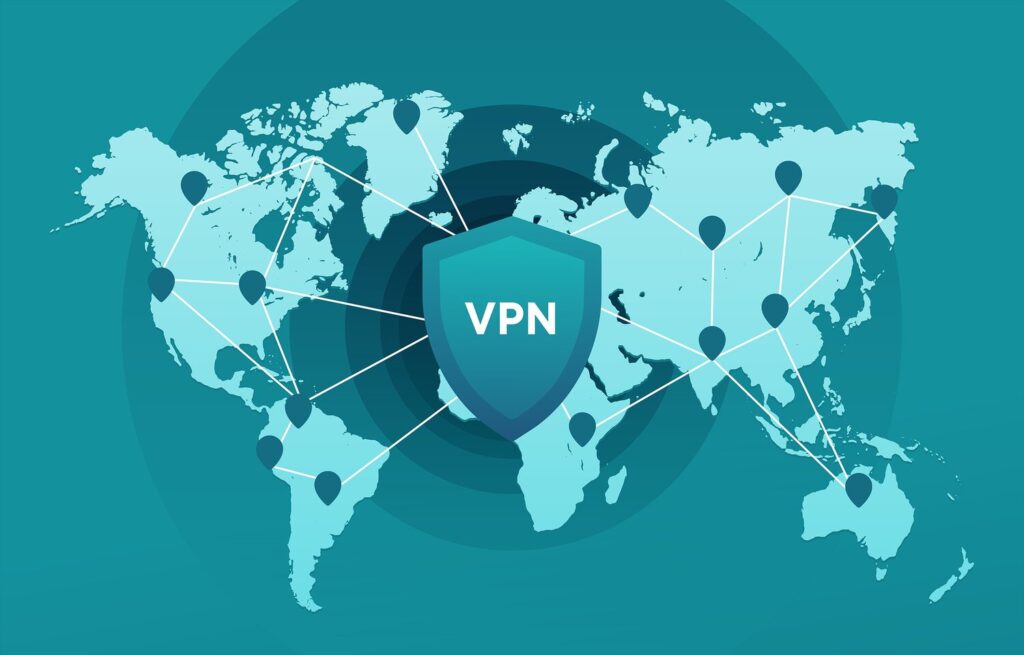
Aura VPN Review – In-Depth Breakdown (2025 Edition)
“The only truly secure system is one that is powered off, cast in a block of concrete and sealed in a lead-lined room with armed guards.” So said Gene Spafford, a former computer science professor at Purdue.
Of course, concrete-encased laptops aren’t particularly useful to digital nomads looking to work remotely. That’s where tools like VPNs come in.
Virtual private networks are designed to encrypt your internet traffic, to prevent people from spying on your activity and/or harvesting your data, whether for marketing purposes or something more sinister. They can also be extremely handy for circumventing annoying site and/or app blocks that prevent you from enjoying the latest TikTok trend or staying in touch with Facebook friends.
As people become more aware of how useful a VPN can be, the marketplace for these types of products has grown and grown. Some businesses specialize purely in VPNs, while others have added them to their portfolio of products.
Aura is the latter kind of company. Rather than offering a standalone VPN, it offers a complete cybersecurity solution that encompasses a VPN alongside antivirus software, as well as optional add-ons like ID theft protection and password management.
Company Background
Aura is an agglomeration of several merged companies. Originally founded in 2017, it’s now part of a cybersecurity corporation that also includes Hotspot Shield VPN and Total AV, among other businesses.
The company is based out of Boston, Massachusetts, which makes sense, since it primarily focuses on the US market, as well as operating in Canada.
Although Aura is arguably best known for its identity theft protection and insurance, it also offers antivirus software, a password manager, credit monitoring and a parental controls system.
Its VPN doesn’t come up often in conversations about the best virtual private networks on the market, but it’s worth considering if you want all your cybersecurity in one place – and at a decent price point.
Core Features
Aura offers apps for Windows, macOS, Android and iOS. The VPN side of things is pretty basic, with little more than an on/off button and a couple of standard features.
Security & Privacy
The VPN tunnel carries data using AES-128 encryption, which is below the level that most VPNs use these days, but still relatively secure.
There’s no information on what kind of protocol Aura uses for its VPN – and you can forget about choosing between WireGuard, OpenVPN or IKEv2. This isn’t Surfshark or ExpressVPN!
Aura’s limitations are quite surprising given it is part of the same company as Hotspot Shield, which has many years of experience in this area. But hey, whatever.
The privacy policy is equally baffling. It claims not to store any browsing activity in a way that can be associated back to you. However, it’s a pretty wishy-washy policy, as the company does store details of what sites its subscribers visit as well as info like IP addresses.
The way Aura justifies its logging Ts and Cs is by saying that these two types of information are not linked in any way on its servers.
As for additional security tools, the big highlight is obviously the antivirus solution that comes with all the VPN packages. This is designed to detect all kinds of malware. On Windows devices, it can even be set to detect threats in real time.
Some of Aura’s VPN plans also come with a safe browsing feature that blocks websites suspected of disseminating malware or operating phishing ploys.
Performance & Server Network
The total number of servers isn’t specified, but there are around 100 virtual locations spread across the world. These include multiple options in the US, Canada and Australia, as well as plenty of options in Europe, South America and Asia.
While the list of server locations isn’t bad, we didn’t think the speed was anything to write home about. We’ll dig into more detailed results further down the page, but the TL;DR version is: it’s good enough for most standard use cases, but nothing special.
Special Features
The Aura app has the option to block ads and trackers built into its infrastructure. However, this feature is only active on certain plans.
The company also offers split tunneling on some devices, allowing you to segment apps and websites into traffic that passes through the VPN tunnel and traffic that bypasses the VPN tunnel.
This can be useful in several scenarios. First, it can speed up connectivity, since anything that bypasses the VPN tunnel is going to load faster. Second, it means you can decide what information you want to be secure and what information you don’t mind being snooped on. Third, it can solve issues that VPNs sometimes cause with other devices on your local network, such as printers.
Speed, Streaming & Torrenting Performance
VPN speeds can fluctuate a lot, depending on server load, latency and a whole host of other factors. That said, we’ve tried to provide a general idea of how Aura performs compared to more established VPN players.
Speed Test Results
We let the Aura app select what it believed was the best option for us. This turned out to be a US server, which gave us middling results.
Downloading: 21.56%
Uploading: 16.27%
Latency: 516.7%
While the connection seemed stable – we didn’t notice any drops – the slowdown in speeds puts Aura firmly in the middle of the pack. It could be worse, but it could definitely be better.
Streaming & P2P Support
We had a really mixed experience with streaming using Aura’s VPN. It did unblock some Netflix libraries, but not all of them. We also couldn’t consistently access BBC iPlayer or Disney+.
When we were able to access Netflix, we had no problems with buffering and resolution (4K – no problem). However, it was pretty hit and miss getting to the stage of choosing a movie or TV show.
As for torrenting, we just couldn’t get this to work at all. Aura claims its VPN servers do support P2P traffic, but that didn’t seem to be the case for our uTorrent.
We should mention that some people online have said they haven’t had the same problems with torrenting as we had. However, we’re also not alone in finding torrenting a no go. Ultimately, you’re going to need to try it yourself.
At least if it doesn’t work for you, there’s a 60-day money-back guarantee!
Security and Data Protection
“Bare bones” are the two words that recurred for us again and again when assessing Aura VPN. It’s just not up to the market standard in a lot of ways, including in its attitude to security and data protection.
Encryption & VPN Protocols
We’ve no idea what kind of VPN protocol Aura uses because the app doesn’t say – and the customer service rep we emailed with couldn’t give us a clear answer either. (We’ll get onto AI chat bot soon enough…)
What we do know is that Aura uses a 128-bit symmetric cypher, AES-128. This provides a good level of encryption, but it’s behind what most VPNs are using these days. AES-256 is the norm now.
That said, some people claim that AES-256 slows down the connection more because the encryption is more complex. The flip side of that conversation is that the slowdown in speeds is insignificant compared to the increase in security.
Honestly, it’s impossible for us to say with any certainty, since we can’t test the two encryption cyphers side by side in a speed race with any degree of accuracy.
No-Logs Policy & Audit History
Aura collects your IP address, allegedly to prevent fraud and provide a better VPN experience. It claims to delete this data point as soon as you disconnect the VPN.
What it doesn’t delete is information about what domains you visit, the amount of bandwidth you use and how long you have the VPN active. All this data is supposedly anonymized and aggregated, so that your individual habits cannot be identified but the company can still benefit from learning about its subscriber base.
None of this is audited that we could see, so all you can do is take the company’s logging policy on trust. Frankly, that’s deeply underwhelming when you compare it to other VPN companies like NordVPN and Proton that undergo regular third-party assessments to verify their privacy claims.
Jurisdiction & Privacy Implications
Aura is based in the US, which doesn’t currently have any laws regarding data retention. That’s a good thing.
However, the US government does have a history of strongarming companies into supplying them with information. That’s (obviously) a bad thing.
In some cases, VPN companies have been known to publicly state they have no-logs policies, while secretly recording user activity at the behest of US intelligence services.
Given that Aura is already recording a lot of user data, as it admits in its privacy policy, there’s a lot of info about you that could be passed onto organizations like the NSA.
You might think that you don’t have anything to hide, but that doesn’t mean that you should just acquiesce to being covertly monitored.
Pricing and Subscription Plans
Aura has a lot of different plans on offer, from individuals plans that focus on identity theft protection to family plans that come with all of Aura’s different cybersecurity products.
We’ve focused on the VPN-centered plans here, but there are other options to check out if you want a more complete cybersecurity suite.
Plan Breakdown
Value provides Aura’s VPN and antivirus software for 3 devices. It includes the full range of VPN server locations, as well as real-time threat protection and malware protection.
Annual subscription: $3 per month ($36 total, renews at $44.99).
Deluxe ups the ante with basic identity theft protection and more security features, including a password manager, ad blocker and personal info monitoring. It covers up to 5 devices.
Annual subscription: $4 per month ($48 total, renews at $69.99).
Ultimate is the most comprehensive option, featuring everything in Deluxe, plus fraud protection and $1 million in identity theft insurance.
Annual subscription: $4 per month ($48 total, renews at $69.99).
The VPN-centered plans don’t offer a free trial, although other packages provide up to 14 days free.
Payment Options & Refunds
Aura’s website accepts debit cards, credit cards and PayPal – no sign of any anonymous crypto option here!
The company offers a generous 60-day money-back guarantee on all annual plans purchased directly through its website. Subscriptions purchased through Amazon are not covered.
Refunds can only be requested through customer support, which means you must have a conversation with a rep before the money-back process is initiated. That’s a bit of a hassle, since getting hold of someone in the membership department seems to be a slog.
Customer Support Experience
Aura’s help center is easy to navigate, with topics neatly divided by product type. The VPN falls under “Online Security,” which covers changing VPN locations and very basic troubleshooting.
It’s unlikely that that the knowledge base will be able to help you with anything other than the simplest of questions and/or issues. Of course, it’s also true that Aura’s VPN has such limited functionality that it doesn’t require much explanation.
After browsing the help center, we turned to the chat feature to see if this could help us with some more complex queries. Unfortunately, it’s “manned” by the most useless AI bot we’ve encountered yet in the VPN field.
There is an option to chat with a real person, but only during working hours on the US Eastern Seaboard. Otherwise, you’re limited to a phone call (entailing endless wait times, judging by our experience) or email (no reply within 24 hours).
Pros and Cons
Pros:
✅ Cheap price for VPN and antivirus
✅ 60-day money-back guarantee
✅ Effective malware protection
Cons:
❌ Only available in the US and Canada
❌ Lacks advanced features
Comparison With Other VPNs (300 words)
| Download/Upload Speed Loss | Number of Servers | Netflix Access | Price Per Month (Annual Subscription) | |
| Aura *Deluxe | 21.56% / 16.27% | Not available | Yes(ish) | $4 |
| NordVPN *Plus | 5.34% / 3.39% | 7,525 | Yes | $5.99 |
| Surfshark *Surfshark One | 7.72% / 32.24% | 3,200 | Yes | $3.39 |
| Proton *VPN Plus | 5.49% / 2.15% | 9,616 | Yes | $4.99 (includes VAT) |
*We’ve selected the midrange option for each service listed above, rather than the basic or premium plan. Speeds and prices will vary according to geography.
Aura doesn’t perform as well in the speed stakes as the top dogs in the VPN market, but the slowdown in download/upload rates isn’t terrible. You should still be able to perform most tasks online, provided you have a strong Wi-Fi connection and don’t have a ton of devices working at once.
The price is certainly tempting, particularly when you consider that the VPN comes packaged with antivirus software. We’ve chosen the mid-range option in the table above, but the cheapest option is $3. By way of comparison, Avast charges $5.83 per month for its VPN-antivirus combo, while McAfee charges $3.33 per month.
Streaming isn’t great on Aura, but it’s passable. We wouldn’t recommend it as a top streaming VPN, but if you’re somebody who isn’t primarily buying a VPN to access geo-blocked content, you shouldn’t have a problem.
User Reviews and Ratings
Since Aura doesn’t have a standalone VPN product, its scores on review sites are based on overall experience of the company. Still, it has established a solid reputation amongst customers, with a 4.4/5 on Trustpilot, a 4.5/5 on the Google Play Store and a 4.7/5 on the Apple App Store.
What people like:
The complete cybersecurity suite. Most users appreciate having the VPN bundled with antivirus and ID theft protection.
The tech support. People largely report a good experience seeking help from customer service around technical issues.
What people don’t like:
The lack of features. Aura’s VPN doesn’t have much of the functionality that VPN specialists offer.
The automatic renewal. Reviewers complain that the renewal process is not transparent.
Final Verdict & Recommendation
Look, let us be brutally honest. Aura’s VPN is for people who don’t know what a VPN is. It’s the kind of product that sounds nice as an added program in a cybersecurity suite, but it isn’t going to satisfy anybody who has a checklist of things they want their VPN to offer.
Obfuscated servers, multi-hop, dedicated IPs – forget about it. The company doesn’t even give you a clear choice of tunneling protocols, while the encryption is below par for the market.
In a similar vein, the logging policy isn’t up to scratch, even if we don’t consider the issue that it isn’t third-party audited.
When it comes to speeds and streaming, it’s passable, but no frontrunner. All the app is really good for is encrypting your traffic – although some would argue that this is really the core use case for a VPN, so maybe that’s enough.
One thing we can’t criticize is the nice array of additional cybersecurity features that you can get bundled with the VPN – or rather that have a VPN bunded with them. And that’s really the big issue here: Aura’s VPN is very obviously the add-on, rather than the other way around.
That’s fine if your primary concern is ID theft protection or even antivirus scans, but if you’re specifically on the hunt for a VPN, you can do better.








Responses